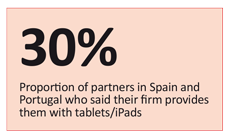Revenue of 20 largest Iberian law firms grows 3% to €1.27bn
An increase in foreign investment in Spain and Portugal meant 17 of the 20 largest Iberian firms increased their revenue in the last year
The combined revenue of the 20 largest Spanish and Portuguese law firms increased by three per cent in the last year to €1.27 billion, according to data collated by Iberian Lawyer. Most of the biggest Iberian firms recorded single-digit growth (see table), though there were three notable exceptions that outstripped their competitors in terms of revenue increases – Ecija (which grew by 21 per cent), Pérez-Llorca (17 per cent), and Broseta (10 per cent).
What´s driving this growth? Lawyers point to an increase in cross-border transactions as an important factor. “There has been a shift in scenario and investors are returning, with new investment opportunities and buyouts boosting the market,” says Jorge Badía, managing partner at Cuatrecasas, Gonçalves Pereira. He adds that law firms now face the challenge of becoming global, which will involve “readjusting management, renewing the careers we offer our lawyers and the training they receive”.
Alejandro Touriño, partner at Ecija – which posted the biggest revenue increase – highlights two key factors generating growth at law firms in Spain. “Growth has been driven by the arrival of new foreign investors, and law firms’ specialisation – areas like technology, the internet and social networks are constantly developing new business models that require the knowledge and specialisation of law firms.”
It is a similar story of improving prospects in Portugal. Nuno Galvão Teles, managing partner of MLGTS, says investment in Portugal has grown and privatisations are attractive to foreign investors, particularly those from China and the US. Another factor driving growth is Portuguese companies’ internationalisation strategies. “The Portuguese economy expanded and appears to be gaining strength,” he adds. “In this context, the practice areas that are more connected to this are mergers and acquisitions, tax, litigation, arbitration, employment, corporate and banking & finance.”
João Vieira de Almeida, managing partner at Vieira de Almeida, expects firms to adopt aggressive growth strategies: “Growth should continue next year, although at the ‘new normal’ rates of one digit for most firms, but those growing inorganically are likely to see increased rates.”
A source at Roca Junyent highlights the globalisation challenge law firms face. “This involves changes in the way law is practised, how the client is managed and the operation of practices themselves – it will compel lawyers to change their profile from the time that they start training at university, and in their first years in practice, as well as their required continued professional development,” the source said.
PLMJ managing partner, Luís Pais Antunes, says law firms’ strategies need revamping: “Leading independent law firms with international clients are focused on having an international presence, both through associations with local firms in the framework of international networks or investing in a physical presence in other jurisdictions.”
On the subject of an improving economy, Duarte de Athayde, managing partner of Abreu Advogados says some companies that slimmed down during the most severe crisis periods have become more profitable with the result that some are “already benefiting from foreign capital investment”.











